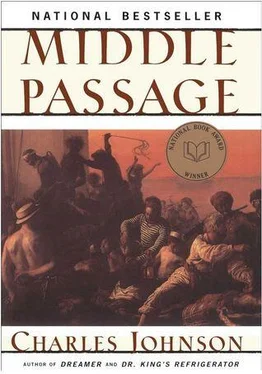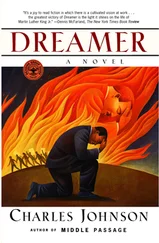Squibb stiffened. “Sir?”
“There’ll be none of that,” says I. “Only Falcon speaks of eating flesh, and he’s under lock and key in his own cabin.”
Squibb’s belly rumbled. He looked down the deck to where Nacta stood with a rifle outside the skipper’s door. “Who’s gonna be captain, then?”
“Cringle, I guess. He’s next in line. And one of their people to watch him.”
The mate looked straight at me.
“Would to mercy I do get my hands on the helm,” said he, rocking his head, “then I plan to steer us to America, so help me. We could steer the ship toward Africa during the day, as the blacks want, then toward the States at night when they’re sleeping.” Again, he sucked his long pipe. “We’ll be docking on Long Island before the Negroes know what hit them.”
“Can we do that?” asked Squibb.
I left a silence.
“What if we don’t find land?”
Again, I could vouchsafe no reply.
“Mr. Calhoun. .”
“Rest easy, Josiah. Whatever we do, the Allmuseri have the next move.”
Which was now, I saw, to complete their peculiar cleansing ritual. From what I could understand, the blacks were not simply offering the skipper’s goat to their god; they were begging him to wash the blood of the Republic’s crew off their hands. Perhaps even more important to them than freedom was the fact that no leaf fell, no word was uttered or deed executed that did not echo eternally throughout the universe. Seeds, they were, that would flower into other deeds — good and evil — in no time at all. For a people with their values, murder violated (even mutilated) the murderer so badly that it might well take them a billion billion rebirths to again climb the chain and achieve human form. Ngonyama wondered, I could see, if it had all been worth it, this costly victory in exchange for their souls, for that indeed was what was at stake. Ironically, it seemed that Falcon had broken them after all; by their very triumph he had defeated them. From the perspective of the Allmuseri the captain had made Ngonyama and his tribesmen as bloodthirsty as himself, thereby placing upon these people a shackle, a breach of virtue, far tighter than any chain of common steel. The problem was how to win without defeating the other person. And they had failed. Such things mattered to Ngonyama. Whether he liked it or not, he had fallen; he was now part of the world of multiplicity, of me versus thee.
And so they placed their foreheads on deck in shame and supplication, praying that the killing would not be carved forever into their nature, and that some act other than the traditional payment for murder — their own deaths in exchange — might be accepted to balance out their world again; that the Republic would be a ferryboat to carry them across the Flood to their ancestral home. When they were done and Ngonyama walked quietly to where we sat, his voice splintered as he spoke, his eyes hardly focusing on me at all.
“We are finished, Ndugu, my brother.” He wiped his forehead with his fingers. “All is in order and ready for the return. We should start at once. My people have decided to sail for Senegambia. You must convince your captain to plot a new course for us.”
Cringle sneered, “Good luck.”
“If he does not,” said Ngonyama, “I can guarantee that all of you will die.”
This was no idle threat. Therefore, twenty paces found me at the skipper’s door. Nacta would not step aside, his wide-legged stance a challenge of sorts as he jiggled in his left hand the ring Falcon wore to unlock his firearms. Down the deck Ngonyama ordered him to step aside. As Nacta moved away, I entered, limping a little on my left side, for the last interview anyone on this earth would have with Ebenezer Falcon.
Entry, the seventh SAME DAY
In the shrunken air of Falcon’s cabin there were secrets too scandalous for me to share with the ship’s company. This was not a knowledge I wanted, but it waited to ambush me, like the Old Man himself, amidst sacks of drachmas, nuggets and bars of gold, and church boxes from sacked coastal towns, strewn along the floor. Anything not destroyed by the explosion, Atufal and Diamelo smashed because it windowed onto the savage world of their enslavers. Where-soever my eyes ranged, aft toward the enormous upended bed, forward to his broken inventions by the larboard wall, his lodgings recalled abandoned manor houses raped and harried by brigands, and thus for a brief moment nothing here was familiar to me. A post-Christian roomscape, it struck me — me whose head was half full of Allmuseri words. The room swirled so for a second I had to plop my hands on my knees, put my head down, and wait until the ship’s hull stabilized. But even then I felt culturally dizzy, so displaced by this decentered interior and the Africans’ takeover, that when I lifted a whale-oil lamp at my heels it might as well have been a Phoenician artifact for all the sense it made to me. Yet in the smoking debris there was movement, a feeble stirring of Icarian man, the creator of cogs and cotton gins, beneath contraptions that pinched him to the splintery floor.
I found his legs trapped under timber. Therewith, I gripped wood with one hand, pushed aside with my other his torn sea charts, lire, egg-sized rings, almanacs, and his log, which he often sat upon to reach his table, then tried raising the beams off him without wrenching my own back. Falcon gave a gruntlike oof. Alow and aloft he was scuppered. When he crawled a few inches by grabbing the base of a bookcase and dragging himself forward, cartilage in his shoulder crackled like worm-addled wood — or, on deeper planes, the unhinging of his atoms. I saw half the ribs on his right side were broken, that he strained not only to deny a physical pain involuted and prismatic but deeper wounds as well. What were these? I could see that all he valued would perish from the indifference of Allmuseri who would no more appreciate the limits and premises of his life than he would theirs, whereby I mean his belief that one must conquer death through some great deed or original discovery, his need to soar above contingency, accident, and, yes, other pirates like John Silver and Captain Teach, his pseudo-genius — to judge it justly — which could invent gadgets but lacked genuine insight, which rained information down on you like buckshot, but in the disconnected manner of the autodidact, which showed all the surface sparks of brilliance — isolation, vanity, idealism — but was adrift from the laws and logic of the heart. All at once I found that I was still ensorcelled by a leader who lived by the principle of Never Explain and Never Apologize. But I pitied him too, for his incompleteness. I pitied him, as I pitied ourselves, for whether we liked it or not, he had changed a people simultaneously for the better and worse, made himself the silent prayer in all their projects to come. A cruel kind of connectedness, this. In a sense we all were ringed to the skipper in cruel wedlock. Centuries would pass whilst the Allmuseri lived through the consequences of what he had set in motion; he would be with them, I suspected, for eons, like an ex-lover, a despised husband, a rapist who, though destroyed by a mob, still comes to you nightly in your dreams: a creature hated yet nevertheless at the heart of all they thought or did.
“Cap’n, this is Rutherford. Do you know me?”
“The galley swab?” His mouth opened horribly in a face as flat and foul-looking as a sea boot.
The skipper’s nervous system, that deep structural mechanism none of us can reason with or talk to, was so damaged from the percussion of falling beams he could not control his bowels or the spastically dancing muscles of his face. Thus, smiles followed morose expressions. These were replaced by petulance, surprise, delight, then grief, as if behind the tarp of his skin several men and women were struggling to break free. I suffer you, then, to consider my shock at seeing him this way, fighting to the end to appear singular and self-reliant when, inly, all Nature in him was seditious. Although dazed by this reel of involuntary emotional masks, I’d seen enough of shipboard surgery to know his only hope was a stiff shot of rum, a sterilized knife to hack off everything below his knees, and henceforth precisely the sort of dependency on others a swashbuckling sea rover — a man so fixed and inflexible in his being — would find intolerable. “Aye, I know you. Is it the end of the world, Mr. Calhoun?”
Читать дальше












